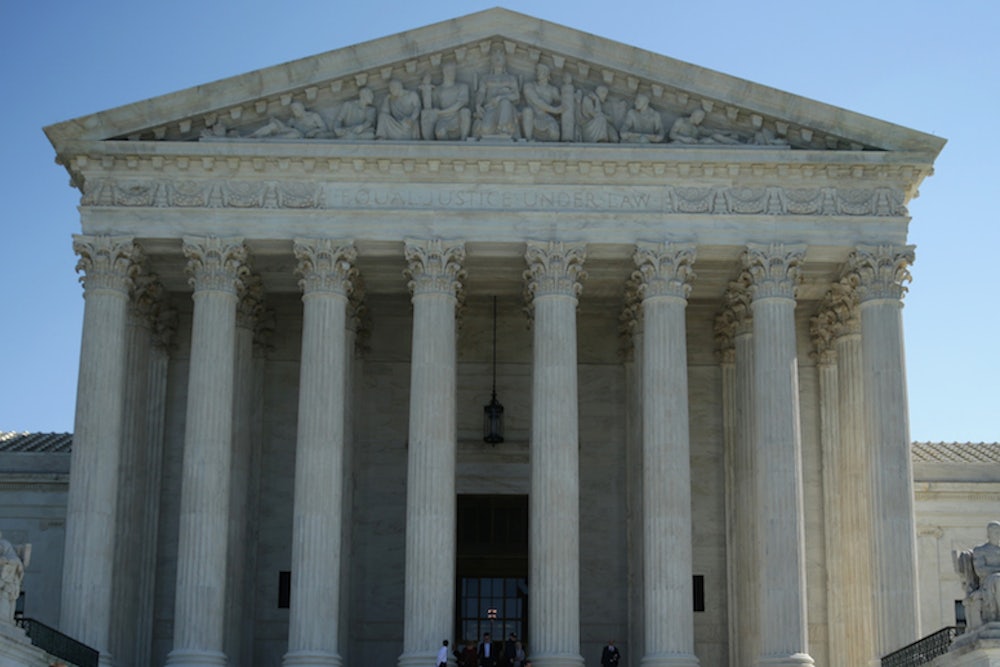This past Monday, when most of the nation was focused on the midterm elections, the Supreme Court hinted that it could be taking seriously the latest right-wing challenge to the Affordable Care Act. In King v. Burwell, ACA opponents have asked the high court to overturn the Fourth Circuit Court of Appeals’ rejection of their argument that ACA tax credits and subsidies are illegal on federally managed state insurance exchanges (of which there are 34 or 36, depending on how one counts). Most court-watchers had expected that the Court would deny ACA opponents’ request. The justices’ standard practice is to wait and remain above the fray, until and unless a split among the circuit courts materializes. However, on Monday, the Court neither denied nor granted review, instead “re-listing” King for consideration at its next internal conference, this coming Friday, November 7.
No one knows what this non-decision actually portends. It could simply mean that the Court has decided to deny review, but is waiting for one or more justices to finish an opinion dissenting from that denial. But SCOTUSBlog’s John Elwood, an expert in the Court’s re-listing process, guesstimates that, based on recent patterns, the postponement of this decision boosts the odds that the Court has the requisite four votes to grant immediate review from less than 2 percent to nearly 50/50. If the Court decides to take the case, it could happen as soon as Monday, November 10. The nation would once again face a multi-month spectacle of watching the Court decide whether Obamacare lives or dies, at least in federal-exchange states, since not only the exchanges, but other essential features of the law could not work without the subsidies. As with the similar 2012 drama over the constitutionality of the ACA’s individual mandate and its expansion of Medicaid, oral argument would probably occur in the early spring and a final decision would arrive at the end of the Court’s term in late June.
If last Monday’s “re-list” decision indicates that the justices are in fact pondering intervention in the ACA tax-credit litigation, they might do well first to take note of one of several friend-of-the-court (“amicus curiae”) briefs filed on Monday with the D.C. Circuit Court of Appeals, which is hearing a similar case. This particular brief was written by 18 state attorneys general in support of preserving subsidies for the ACA’s federal run exchanges, including 11 AGs from states that delegated management of their exchanges to Healthcare.gov. In it, they warned that a ruling against the exchanges would “deprive millions of low- and moderate-income Americans of billions of dollars in federal premium assistance needed to buy health insurance.” Among the signatories were the attorneys general from battleground states like Virginia, North Carolina, Pennsylvania, Iowa, New Mexico, and New Hampshire, as well as deeply conservative states like Arkansas and Mississippi. It’s a far more geographically and ideologically diverse show of support for affordable insurance through the exchanges than had surfaced to date.
The AGs’ brief also comes up with a shrewd argument to put anti-ACA judges and justices in a potentially embarrassing ideological bind. The pro-ACA attorneys general relied on a states-rights argument. In 1981, then-Associate Justice William Rehnquist wrote that respect for state “sovereignty” requires that the text of any law spell out, with “unambiguous” clarity, precisely what strings are attached, to “enable the States to exercise their choice knowingly.” The AGs took up this argument, quoting none other than Chief Justice John Roberts that “While Congress’ power to legislate under the spending power is broad, it does not include surprising participating States with postacceptance or ‘retroactive’ conditions.’” Were a court to adopt the challengers’ perverse interpretation, the AGs suggested, it would impose constitutionally suspect “postacceptance” consequences on the ACA’s offer to provide a federally run exchange for states that declined to create their own. The AGs’ brief pointedly asks: Do conservatives on the bench remember their solicitude for states’ rights only when it’s convenient?

